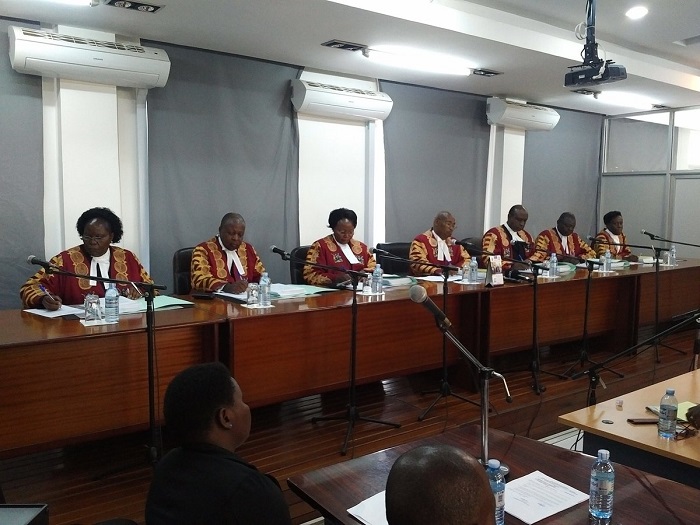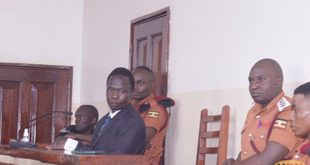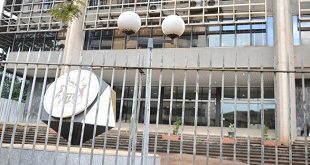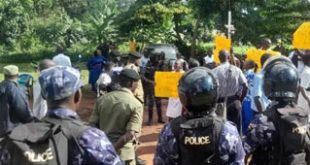
The Supreme court has today given its detailed reasons for their ruling in the Uganda Presidential Election Petition No 1 of 2016 and identified 10 key reforms that it wants the Attorney General to implement ahead of the next elections.
“The Attorney General must follow up the recommendations made by this court with the other organs of state, namely parliament and the executive,” Justice Jotham Tumwesigye said Friday. “The Attorney General shall report to the court within two years from the date of this Judgment the measures that have been taken to implement these recommendations”
The Ugandan judges gave detailed reasons for the judgment they made earlier this year, throwing out the legal challenge by Amama Mbabazi to President Yoweri Museveni’s fifth-term election victory. (See 320 page detailed ruling BOTTOM)
“The Election Commission nominated Museveni lawfully in accordance with the Presidential Elections Act,” Chief Justice Bart Katureebe said in the summary of the ruling on March 1, 2016.
This was repeated Friday by Justice Tumwesigye who read the full judgement in the absence of Katureebe who is out of the country.
Areas the court identified that in their view need reform are:
1. The Time for filing and determination of the petition: In the course of hearing this petition, the issue of the inadequacy of the time provided in Article 104(2) and (3) of the Constitution for filing and determining of presidential election petitions came up.The same issue was also pointed out by this Court in the two previous presidential election petitions. The 10 day period within which to file a presidential election petition and to gather evidence and the 30 days within which the Court must analyze the evidence and make a decision as provided under Article 104(2) and (3) of the Constitution and section 59(2) and (3) of the PEA is inadequate. We recommend that the period be reviewed and necessary amendments be made to the law to increase it to at least 60 days to give the parties and the Court sufficient time to prepare, present, hear 5 and determine the petition, while at the same time being mindful of the time within which the new President must be sworn in.
2. The nature of evidence: Whilst the use of affidavit evidence in presidential election petitions is necessary due to the limited time within which the petition must be determined, it nevertheless has serious drawbacks mainly because the veracity of affidavit evidence cannot be tested through examination by the Court or cross-examination by the other party. Affidavit evidence on its own may be unreliable as many witnesses tend to be partisan. We recommend that the Rules be amended to provide for the use of oral evidence in addition to affidavit evidence, with leave of court.
3. The time for holding fresh elections: Article 104(7) provides that where a presidential election is annulled, a fresh election 20 must be held within 20 days. We believe this is unrealistic, given the problems that have come to light in the course of hearing all the three petitions that this Court has dealt with to-date. In all these petitions, the Commission has been found wanting in some areas. Importation of election materials has sometimes been a problem. Securing funds has also often provided challenges.Therefore, to require the Commission to hold a free and fair election within 20 days after another has been nullified is being overly optimistic. A longer and more realistic time-frame should be put in place.
4. The Use of technology: While the introduction of technology in the election process should be encouraged, we nevertheless recommend that a law to regulate the use of technology in the conduct and management of elections should be enacted. It should be introduced well within time to train the officials and 10 sensitize voters and other stakeholders.
5. Unequal use of State owned media: Both the Constitution in Article 67(3)and the PEA in section 24 (1), provide that all presidential candidates shall be given equal time and space on State-owned media to present their programmes to the people. We found that UBC had failed in this duty. We recommend that the electoral law should be amended to provide for sanctions against any State organ or officer who violates this Constitutional duty.
6.The late enactment of relevant legislation: We observed 20 that the ECA and the PEA were amended as late as November, 2015. Indeed the Chairman of the Commission gave the late
amendment of the law as the reason for extending the nomination date. We recommend that any election related law reform be undertaken within two years of the establishment of the new Parliament in order to avoid last minute hastily enacted legislation on elections.
7.Donations during election period: Section 64 of the PEA deals with bribery. We note that Section 64(7) forbids candidates or their agents from carrying out fundraising or giving donations during the period of campaigns. Under Section 5 64(8), it is an offence to violate Section 64 (7). However, we note that under Section 64 (9) a candidate may solicit for funds to organize for elections during the campaign period. Furthermore, a President may in the ordinary course of his/her duties give donations even during the campaign period. This section in the law should be amended to prohibit the giving of donations by all candidates including a President who is also a candidate, in order to create a level playing field for all.
8. Involvement of public officers in political campaigns: The law should make it explicit that public servants are prohibited from involvement in political campaigns.
9.The role of the AttorneyGeneral in election petitions: The Attorney General is the principal legal advisor of Government as per Article 119 of the Constitution. Rule 5 of the PEA Rules also requires the Attorney General to be served with the petition. We found that several complaints were raised against some public officers and security personnel during the election process. However, the definition of “respondent” in Rule 3 of the PEA Rules as it currently is, does not include the Attorney General as a possible Respondent.Further, Rule 20(6) of the PEA Rules, provides that even when a Petitioner wants to withdraw a petition, the Attorney General can object to the withdrawal. The law should be amended to make it permissible for the Attorney General to be made Respondent where necessary.
10.Implementation of recommendations by the Supreme Court: We note that most of the recommendations for reform made by this Court in the previous presidential election petitions,have remained largely unimplemented. It may well be that no authority was identified to follow up their implementation. We have nevertheless observed in this petition that the Rules require that the Attorney General be served with all the documents in the petition. We have further noted that the Attorney General may object to withdrawal of proceedings. Therefore the Attorney General is the authority that must be served with the recommendations of this Court for necessary follow up.
Uganda Election Petition Full Judgement by The Independent Magazine on Scribd
 The Independent Uganda: You get the Truth we Pay the Price
The Independent Uganda: You get the Truth we Pay the Price



“Justices” ? Change it to “cowards” period.